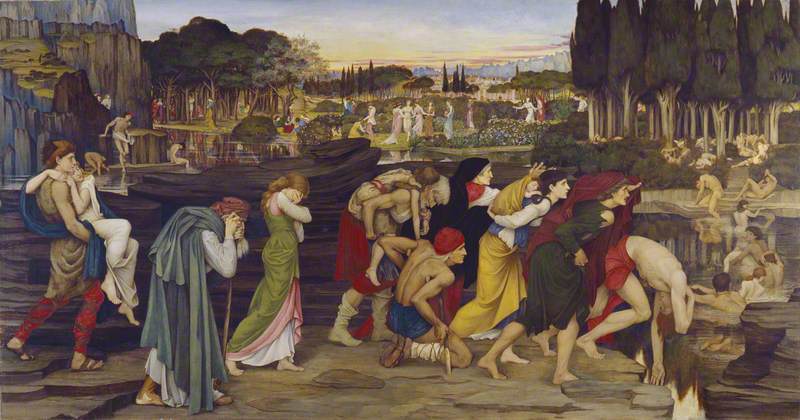I once met a very talented young woman with the last name Avila. She told me that her family would sometimes say in jest that their great-great-great aunt was Teresa of Avila. But they had no idea whether this was true. They might just as well have been descended from Pedro of Avila, the town drunk. Or both. Your ancestry, like your extended family, is often a mixed bag.
I was once asked whether I was descended from the famous Captain John Smith saved by the prayers of Pocahontas. I said: “A guy who annoys people so much they want to kill him and has to be saved by the heroic efforts of a devoted woman: that sounds like a relative of mine.” But like Miss Avila, I have no idea.
My assumption about my ancestors is that it consists of a pack of ne’er-do-wells all the way back to the beginning of time. I sometimes think: My great-great-great-times-ten-to-the-fifteenth-power-great grandfather was Adam, the guy who screwed it all up in the beginning. Many people don’t know this, but his full name was Adam Smith, but not the economics guy. I trace myself back to a long line of sinners and screw-ups. This makes sense to me. It helps me make sense of the world.
What doesn’t make as much sense to me is the notion of past lives. When someone says, “In a past life, I was a brilliant doctor,” I wonder, “Okay, but how is that going to help you in medical school now?” Often people claim that in one of their “past lives” they were some important king or queen. Rarely do people say, “In my past life, I was a drunk rapist who was stabbed by a woman I was assaulting on a street in Chicago, so I need to do penance.”
One thing that makes the ersatz Western notions of reincarnation meaningless (as opposed to the more serious, morally-involved Eastern notions) is that you forget everything from your past life. You must cross the River Lethe, the river of forgetting. This is essential because we generally don’t remember things from a past life.
Walker Percy discusses the prospect of forgetting one’s life in his book Lost in the Cosmos. A man wakes up and has amnesia. He encounters an entirely new woman who embraces him, some interesting new children, a new house. These are stories about the tiredness of self.
This view turns reincarnation into the ultimate do-over. My slate is wiped clean, and I start again. I get to rid myself of myself, become someone new, and get busy screwing up another life. The suffering I caused goes on, but I just forget about it and live on, slate clean. We can’t learn anything from the mistakes of our previous lives if we don’t remember them, if there is no process of accumulated wisdom.

This ersatz Western notion of reincarnation is individualistic and lacks any serious notion of moral accountability, in a way suspiciously congenial to the tendencies of modern liberal culture. The Eastern view is much more morally rigorous; you could be reincarnated for the evil you do as a slug or an “untouchable.” You are responsible even for choices you don’t remember making as a person you had no idea you were. This has its own problems, but it’s a serious view.
And yet, if I forget everything I ever learned, everyone I ever loved, what was the point of that life? This, to me, is the greatest fear of all. I lived a life, and then it’s gone. I remember nothing; my experiences and relationships are all forgotten, lost. And the people to whom I connected myself in love, they’re gone too.
We need a notion of the afterlife for this life to be meaningful. But we also need a notion of the afterlife that doesn’t make this life meaningless.
To my mind it makes more sense of this life, the life I actually have to live right now, for me to affirm that my first parent was created good, “in the image of God,” but chose evil. Thus I find within myself a split: the good I want to do I don’t do, and the evil I don’t want to do, I do. I hear “Love you neighbor as yourself” and say: “That’s the way I want to live.” But then I don’t. I get selfish. So now what?
The Christian notion of the afterlife involves redemption from sin and the resurrection of the body into the communion of saints. I am united with my Loving Source. But precisely because God is a loving communion of persons, the Father not obliterating the Son or the Spirit – a perfect unity in diversity, diversity in unity – Christians can believe that we can be united with God and with the saints and not lose ourselves. Rather, I retain all that is truly me, including my memories and relationships, without the sinfulness that negates me.
If I walk through any river, I want it to be a river of purgation. There are some results of my ancestor Adam Smith’s screw-up I’d like to be rid of. Not memories; not even memories of sin: I learned from them and God’s grace brought me through them, so I should keep them. But all those bad dispositions that kept me from loving others fully – greed, selfishness, anger, bitterness, cruelty, cynicism, laziness, being self-involved – I’d be happy to be rid of those things. In fact, I don’t think I’ll be truly happy until I do rid myself of them.
I’m not looking for another life to screw up. I prefer to keep this one – and live it fully.















